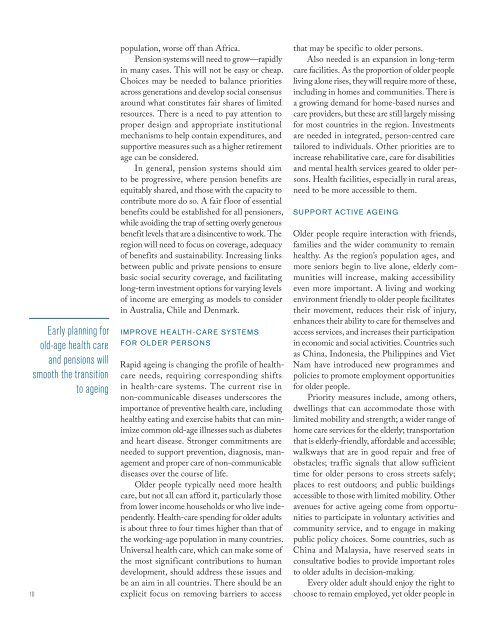SHAPING THE FUTURE HOW CHANGING DEMOGRAPHICS CAN POWER HUMAN DEVELOPMENT
1VPo4Vw
1VPo4Vw
Create successful ePaper yourself
Turn your PDF publications into a flip-book with our unique Google optimized e-Paper software.
Early planning for<br />
old-age health care<br />
and pensions will<br />
smooth the transition<br />
to ageing<br />
10<br />
population, worse off than Africa.<br />
Pension systems will need to grow—rapidly<br />
in many cases. This will not be easy or cheap.<br />
Choices may be needed to balance priorities<br />
across generations and develop social consensus<br />
around what constitutes fair shares of limited<br />
resources. There is a need to pay attention to<br />
proper design and appropriate institutional<br />
mechanisms to help contain expenditures, and<br />
supportive measures such as a higher retirement<br />
age can be considered.<br />
In general, pension systems should aim<br />
to be progressive, where pension benefits are<br />
equitably shared, and those with the capacity to<br />
contribute more do so. A fair floor of essential<br />
benefits could be established for all pensioners,<br />
while avoiding the trap of setting overly generous<br />
benefit levels that are a disincentive to work. The<br />
region will need to focus on coverage, adequacy<br />
of benefits and sustainability. Increasing links<br />
between public and private pensions to ensure<br />
basic social security coverage, and facilitating<br />
long-term investment options for varying levels<br />
of income are emerging as models to consider<br />
in Australia, Chile and Denmark.<br />
IMPROVE HEALTH-CARE SYSTEMS<br />
FOR OLDER PERSONS<br />
Rapid ageing is changing the profile of healthcare<br />
needs, requiring corresponding shifts<br />
in health-care systems. The current rise in<br />
non-communicable diseases underscores the<br />
importance of preventive health care, including<br />
healthy eating and exercise habits that can minimize<br />
common old-age illnesses such as diabetes<br />
and heart disease. Stronger commitments are<br />
needed to support prevention, diagnosis, management<br />
and proper care of non-communicable<br />
diseases over the course of life.<br />
Older people typically need more health<br />
care, but not all can afford it, particularly those<br />
from lower income households or who live independently.<br />
Health-care spending for older adults<br />
is about three to four times higher than that of<br />
the working-age population in many countries.<br />
Universal health care, which can make some of<br />
the most significant contributions to human<br />
development, should address these issues and<br />
be an aim in all countries. There should be an<br />
explicit focus on removing barriers to access<br />
that may be specific to older persons.<br />
Also needed is an expansion in long-term<br />
care facilities. As the proportion of older people<br />
living alone rises, they will require more of these,<br />
including in homes and communities. There is<br />
a growing demand for home-based nurses and<br />
care providers, but these are still largely missing<br />
for most countries in the region. Investments<br />
are needed in integrated, person-centred care<br />
tailored to individuals. Other priorities are to<br />
increase rehabilitative care, care for disabilities<br />
and mental health services geared to older persons.<br />
Health facilities, especially in rural areas,<br />
need to be more accessible to them.<br />
SUPPORT ACTIVE AGEING<br />
Older people require interaction with friends,<br />
families and the wider community to remain<br />
healthy. As the region’s population ages, and<br />
more seniors begin to live alone, elderly communities<br />
will increase, making accessibility<br />
even more important. A living and working<br />
environment friendly to older people facilitates<br />
their movement, reduces their risk of injury,<br />
enhances their ability to care for themselves and<br />
access services, and increases their participation<br />
in economic and social activities. Countries such<br />
as China, Indonesia, the Philippines and Viet<br />
Nam have introduced new programmes and<br />
policies to promote employment opportunities<br />
for older people.<br />
Priority measures include, among others,<br />
dwellings that can accommodate those with<br />
limited mobility and strength; a wider range of<br />
home care services for the elderly; transportation<br />
that is elderly-friendly, affordable and accessible;<br />
walkways that are in good repair and free of<br />
obstacles; traffic signals that allow sufficient<br />
time for older persons to cross streets safely;<br />
places to rest outdoors; and public buildings<br />
accessible to those with limited mobility. Other<br />
avenues for active ageing come from opportunities<br />
to participate in voluntary activities and<br />
community service, and to engage in making<br />
public policy choices. Some countries, such as<br />
China and Malaysia, have reserved seats in<br />
consultative bodies to provide important roles<br />
to older adults in decision-making.<br />
Every older adult should enjoy the right to<br />
choose to remain employed, yet older people in


